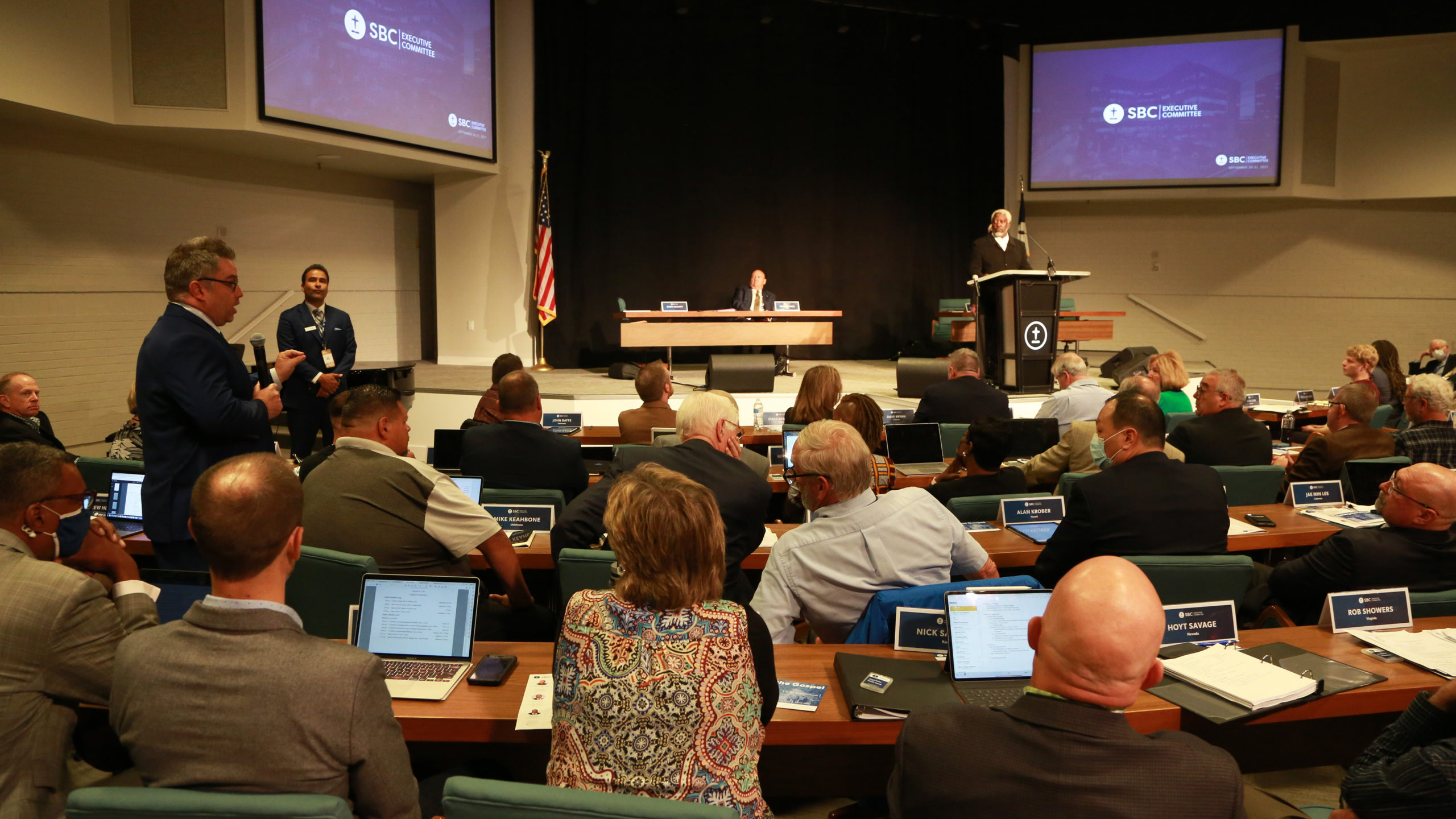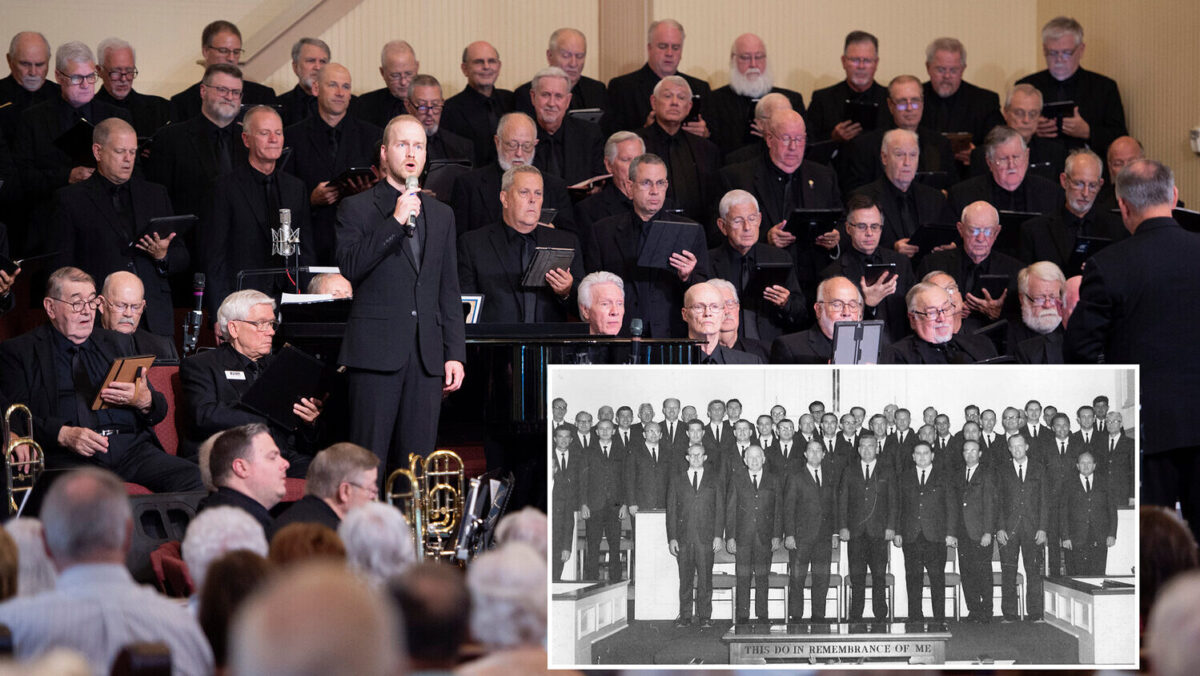Within a week, a decision is set to be announced related to the parameters of the investigation into how the Executive Committee of the Southern Baptist Convention handled sexual abuse cases brought to its attention during the past 20-plus years.
That is, assuming the Executive Committee officers adhere to the Sept. 28 deadline mandated in the motion approved by a majority of the full body Sept. 21 (see full wording of the motion below).
The two-day meeting beginning Sept. 20 brought a full house of guests and almost all of the 86 EC members to Nashville in anticipation of historic action.
But the group’s inability to make a definitive decision about whether to waive attorney-client privilege drew anger and confusion from some members of the group as well as Southern Baptists across the nation.
Backlash traveled quickly across social media channels, and by the next morning several groups and individuals were releasing statements clarifying their stands and/or explaining their reasoning behind decisions made or not made.
It likely took everyone getting some food and a few hours sleep to be able to process what took place before preparing those statements because by the time the marathon meeting was adjourned, expressions of “wiped out,” “exhausted” and “emotionally spent” could be heard from several in the room.
But even before the intense sense of fatigue at the end, the group walked in with an immense heaviness. The 27 new members attending their first meeting especially felt overwhelmed with the decisions in front of them.
‘Baptized by fire’
Veteran members of the group referenced their concern for the freshman trustees several times, including Texas pastor Jared Wellman. “They are being baptized into all of this not by fire, but by nuclear bomb,” he said.
Wellman is the EC member who proposed waiving attorney-client privilege through a substitute motion to the officers’ original motion. Wellman’s proposal failed 55 to 20.
The vote on his proposal was a roll-call vote, so those in the auditorium and any of the more than 200 people watching the livestream at the time knew how each member voted.
Wellman and others also released a document with the votes, and many of those who voted against the motion to waive privilege were pressed hard about their reasoning — so much so Wellman addressed it in an interview with Baptist Press the next day.
“There are a lot of good people on the Executive Committee,” he said in the BP article. “And just because they voted ‘no’ doesn’t mean they’re evil. … A lot of them, I would imagine, probably needed more time and in the moment made the best vote that they could make with their conscience, and I can respect that. I can disagree with it, but I can respect it.”
Still, the intensity of the debate among EC members and the lines drawn left bystanders sensing three groups among them:
- Those all in for full transparency and waiving attorney-client privilege: a no question, “let the chips fall where they may” kind of response and the only way for a truly trustworthy report.
- Those seeming to understand the need for the investigation but concerned about the potential for loss of insurance coverage or future litigation (even for other matters) if attorney-client privilege is waived. The term “fiduciary responsibility” — trust and duty to act in the best interest of the entity being served — surfaced consistently among this group as a reason to find another way to accomplish the investigation goal without waiving privilege.
- Those not yet in option 1 or 2 but genuinely wanting to make the right decisions and attempting to understand all the layers involved while analyzing the arguments from the two main opposing sides.
With the divisions only growing deeper by the minute, the group indicated a desire to make a decision — and “to not go home without a decision made.”
But when the EC officers’ long-anticipated recommendation was unveiled after a nearly two-hour delay for last-minute tweaks, frustration levels soared.
The stunned stillness and thick silence hung heavy in the air disrupted only by the sobs of sexual abuse survivor Hannah Kate Williams, who along with Jessica Alldredge and Tiffany Thigpen, sat through the full two days of proceedings. Survivor Jennifer Lyell also attended the first day, and friends of the survivors joined the young women in the audience.
‘Confused and upset’
EC members were snapped out of their stupor by Adam Wyatt from Mississippi, when he shouted, “What does this even mean?
“This has been the elephant in the room for months. … How does this do anything that the messengers demanded of us? I’m confused and upset. I’m not being facetious. I don’t know what this means.”
EC secretary Monte Shinkle of Missouri replied, “What this means is that we are doing some extremely hard lifting. … We want the investigation while also maintaining our fiduciary responsibilities.
“It’s our best hearted effort to do both,” he said.
Wyatt countered: “If we don’t do what the messengers said, we are telling messengers they are no longer in charge.”
With Baptist polity calling for a bottom-up approach to authority and local church autonomy, could an Executive Committee decision to adapt what was mandated in a motion by messengers indicate a top-down concept and thus open the SBC up to lawsuits?
And the other question is: Does a decision not to waive attorney-client privilege in this situation actually go against what the messengers requested in June?
Some EC members say it doesn’t, that they found a way to capture the spirit of the motion through the recommendation they proposed.
They added that if the messengers had truly understood the potential for financial risk they would have worded the motion differently.
Wyatt added, “This issue is a substantial issue, but the messengers said to do it. We have a responsibility to do it. If this thing blows up, then we go to Anaheim and say this is a disaster, now what do you want us to do?”
Intention to cooperate
North Carolina pastor Bruce Frank, chairman of the Sexual Abuse Task Force, advocated for waiving privilege but urged the EC members to make a decision one way or the other before leaving.
“Let’s do what [the messengers] said or not and live with it,” he said. “Don’t push it down the road and hope it goes away.”
EC chairman Rolland Slade explained in the opening session, “It is the intention and desire of our officers, staff and the Executive Committee to cooperate fully within the bounds of our fiduciary duties. We are not attempting to do anything but that.”
And when a decision had still not been made by the next day’s 4 p.m. deadline unofficially set by EC officers, Slade almost lost his cool.
“The frustration that we are facing is because this is a serious issue that we are all concerned about, and we are all on the same team. We are all in the same house, and we all know a house divided cannot stand. The original recommendation from the officers was to give us some time,” he said. “No one here is trying to say we don’t want to do this.”
EC officers’ motion
The original recommendation, rejected by the body stated:
“Whereas the SBC Executive Committee believes that there is a workable path to achieve a full and fair investigation that does not sacrifice its responsibilities or jeopardize the future work of the Southern Baptist Convention; now, therefore, be it
“Resolved that the … Committee authorizes payment equal to the budget as requested by the Sex Abuse Task Force subject to the achievement of an acceptable agreement on a way forward taking into account the Motion and the fiduciary obligations and will fund the review in a manner consistent with the source identified in the motion — through funds provided by the Cooperative Program; and be it further
“Resolved that the officers of the … Committee are authorized consistent with the EC bylaws to work on behalf of the full board in order to expeditiously reach a path forward for the important work of the investigation; and be it finally
“Resolved that the SBC Executive Committee humbly appeals to the Sex Abuse Task Force to work in cooperation with us to expeditiously conduct a third-party review and provide the desired answers for Southern Baptists.”
The original motion never gained traction, and in the end EC member Melissa Golden from Alabama was able to word the compromise piece that was approved, allowing the investigation to get started.
Pending concerns
Related to the pending aspects of how the EC will work with the task force and Guidepost Solutions, the third-party firm selected to do the investigation, and what to do about attorney-client privilege, the EC was to have convened electronically no later than Sept. 28 to learn the results and vote.
Julie Myers Wood, chief executive officer of Guidepost Solutions, urged Executive Committee members to waive the privilege, as did Frank and the task force.
“A nonprofit that doesn’t have the trust of either the messengers or the mission or the missions field is going to be impacted far more by not dealing transparently with any mess than if they deal honestly with it,” Frank said. “There is a huge cloud over our convention right now. We can run away from it. We can pretend it’s not there. But there is a huge cloud that alleges that some of our leaders have not cared for, not shepherded, not responded to efforts to improve how we care for survivors and best prevent sexual abuse in our convention.
“The investigation is going to take place either now or later,” he added. “Likely when it takes place, there are going to be some things that hurt, things we should have done better. … This can be an amazing time where we deal with any potential junk, a thorough investigation in front of a watching world, and have an amazingly fresh start.”
Wood added that attorney-client privilege can be tricky. “In this context, the motion is talking about the Executive Committee’s corporate privilege and … there are many relevant documents not covered under this privilege.
“I encourage the Executive Committee to waive the attorney-client privilege. … It was the will of the messengers. … Waiving is the only way to ensure the investigation is purely credible,” she said.
Wood also acknowledged there was no pending lawsuit when the motion was passed by messengers in June. That has changed, however.
Hannah Kate Williams filed a suit Aug. 16 alleging an attempt to defame her and shut down her requests. It names the EC along with Southern Seminary, Lifeway Christian Resources, her father and eight SBC figures.
The lawsuit was not discussed during the meeting, only referenced in the question about timing.
‘Fair … to think through it’
Wood noted, “I think the Executive Committee will look hard at anything they give to us because that will certainly be an item that is requested by counsel in a new lawsuit. I think that is certainly a fair thing to do to think through … our potential exposure on really privileged facts.
“This is a very important decision for the EC to make. … I would ask you to think through what sort of transparency are you looking to have,” Wood said.
The sexual abuse survivors attending the opening night plenary session were welcomed officially by Slade and received a standing ovation.
“We are praying for you and thank you for being understanding and patient with us as we do our best to glorify God and protect you.”
Compromise motion approved by EC members 9-21-21
“Resolved that the SBC Executive Committee authorizes funding the GuidePost Solutions budget of $1.6 million from the source identified in the motion — through funds provided by the Cooperative Program — and requests the Task Force and EC officers to agree on a contract in 7 days without waiving complete attorney-client privilege at this time; and be it further
Resolved that the SBC Executive Committee continue negotiating legal means of accomplishing the goal of a public internal investigation and submit this agreement to the Executive Committee, Task Force, and GuidePost, by September 28, 2021; and be it finally
Resolved that, at this point, attorney-client privilege is not yet being waived but is being fleshed out through negotiation.”
To read more about the survivors, click here.








